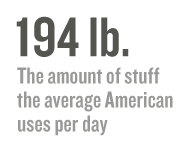Short goes so far as to call for a halt to future population growth. After all, the most profound way a U.S. citizen can impact climate change is to have fewer children, since every American child born today will add almost 10,000 metric tons of CO2 to the atmosphere under current conditions — five times more than a Chinese child and 160 times more than a baby from Bangladesh. Having one fewer child would reduce a family’s greenhouse gas impact 20 times more than driving a Toyota Prius, using Energy Star appliances and other environmentally friendly lifestyle choices combined, according to researchers at Oregon State University.
Eating Away
But the real problem today — as it has been since at least the time of Thomas Malthus — may be food. Simply to maintain today’s number of chronically malnourished or outright starving people — 1 billion — in 2050 with a larger population and present crop yields would require clearing 900 million additional hectares of land. At most, there are an additional 100 million hectares to add to the 4.3 billion already under cultivation worldwide, according to Pedro Sanchez, director of the Tropical Agriculture and the Rural Environment Program at the Earth Institute.
Concerns about population growth often boil down to concerns about too many of the wrong sort of people.
“Agriculture is the main driver of most ecological problems,” says economist Jeffrey Sachs, director of the Earth Institute at Columbia University. “We are literally eating away the other species on the planet.” After all, humans now directly employ some 40 percent of the total land area of Earth.
Nor can the solution be found in the ongoing increase in nature reserves, which currently cover some 15 million square kilometers of the planet. “There are desperately poor people surrounding many of these reserves,” Ehrlich says. “If I was there, I would shoot the hippo and eat it too.”
Concerns about population growth often boil down to concerns about too many of the wrong sort of people, as evidenced by recent efforts to tie environmental and anti-immigration efforts, such as an unsuccessful bid by nativist John Tanton to turn the Sierra Club against immigration. After all, governments from France to Australia pay their citizens to have babies in an effort to ward off the baby bust — and those efforts seem to be working. Women in developed countries are having more children again, according to demographer Mikko Myrskylä of the University of Pennsylvania. “Increases in development are likely to reverse fertility declines — even if we cannot expect fertility to rise again above replacement levels,” Myrskylä writes in Nature. “We expect countries at the most advanced development stages to face a relatively stable population size.”
That does not include immigration, of course, which some environmentalists decry as a threat to the sustainable future of the U.S. Yet the U.S. has only 80 people per square mile compared with 140 per square mile in Mexico, to take just one example. Immigration may actually reduce environmental pressures elsewhere — such as Haiti, where 760 people live for every square mile of countryside. And immigration remains the single most effective poverty alleviation program on the planet, according to economist Lant Pritchett of Harvard University. He argues that labor (i.e., people) should be as free to move internationally as capital (i.e., money).
It’s the Consumption, Stupid
 Ultimately, the problem isn’t the number of people, necessarily. It’s what those people do. The average American (just one of 309 million) uses up some 194 pounds of stuff—food, water, plastics, metals and other things — per day, day in and day out. We consume a full 25 percent of the world’s energy despite representing just 5 percent of global population. And that consumerism is spreading, whether it be the adoption of cars as a lifestyle choice in China or gadget lust in the U.S.
Ultimately, the problem isn’t the number of people, necessarily. It’s what those people do. The average American (just one of 309 million) uses up some 194 pounds of stuff—food, water, plastics, metals and other things — per day, day in and day out. We consume a full 25 percent of the world’s energy despite representing just 5 percent of global population. And that consumerism is spreading, whether it be the adoption of cars as a lifestyle choice in China or gadget lust in the U.S.
“Consumerism is now spreading around the world,” says Erik Assadourian, a senior fellow at the Worldwatch Institute. “Is this going to keep spreading? Or are countries going to start recognizing that this is not a good path?”
What’s needed is the wholesale junking of the disposable life, Assadourian says, “a world where machismo is not connected to the size of a car but the fact that you don’t have one at all.” That may not be all our fault. “We are not stupid, we’re not ignorant, we don’t even necessarily have bad values with respect to the environment,” says political scientist Michael Maniates of Allegheny College. “We’re trying to do our best within cultural systems that elevate unsustainable choices.”
The world already grows enough food to feed 10 billion people — if we all ate a vegetarian diet, Cohen notes. Such lifestyle changes may prove unpalatable, transforming everything from how the dead get buried to gadgets that last a lifetime or more.
As simply put by the United Nations Millennium Ecosystem Assessment in 2005: “Human activity is putting such strain on the natural functions of Earth that the ability of the planet’s ecosystems to sustain future generations can no longer be taken for granted.” In other words, we just might let the world go to the dogs. ![]()
This article originally appeared in the Summer 2010 issue of Momentum magazine, Ensia’s predecessor.
Ensia shares solutions-focused stories free of charge through our online magazine and partner media. That means audiences around the world have ready access to stories that can — and do — help them shape a better future. If you value our work, please show your support today.
Yes, I'll support Ensia!

But what many advocates of lower consumption don’t realize is that the U.S. population is both consuming at an unsustainable pace and also growing at a historically pace unprecedented in the developed world.
In contrast, the countries of the European Union, which in 1980 had a combined population twice the size of the 225 million recorded in the 1980 U.S. Census, has grown by a modest 10% since then. The U.S., meanwhile, has grown by 40% in the same time frame, adding 90 million people to the largest and most wasteful society on the planet.
This pace is expected to continue even without the increases proposed by immigration reform, but the White House just released a “Fact Sheet” which claims that ““U.S. population growth is projected to fall almost in half over the next three decades.”
http://www.uspolicy.be/headline/white-house-fact-sheet-economics-immigration-reform
This is a dubious statement based on percentage of a rapidly growing whole, but it is flat-out false in regards to numerical growth, which reflects more accurately the climate impacts and the failures to maintain our infrastructure in keeping with this expansion.
For a more detailed analysis in video and text form, see
www.onethirdorunder.org
Global replacement rate is 2.33 children per woman.
USA = 2.4, UK = 1.7, Aus = 1.76 (2000-05), so telling people to "take responsibility" is really pointing the finger at the third world.
Claiming 'education' is the solution & presenting rich educated Indian girls wanting one child as evidence is ingenuine. Since only the well off can afford education, that evidence rather points to the effect of material security on family size.
Large families provide the only security the poor can achieve, risky as that strategy is for them. But their desperate need for security questions how the first world exploits the third world to provide the standard of living WE demand.
India uses 1.3ha of the earth / person - we use between 3 & 4 times that, but sustainability (and justice!) demands we reduce that to 2ha. It is more pleasant to focus on their ignorance, isn't it.
We should demolish the fraud being committed - we haven't got time to be going down wrong paths blaming the poor for the state of the planet or its future!
Selling an idea is often about telling enough truth to slip in the lie unnoticed from which you can profit.
Just thought I needed to say something.
Regrds
Chris Baulman
@landrights4all
earth's sustainability and our cooling population growth rate doesn't fix the damage caused by the influence we have on raising everyone else's footprint by bad example.
And how is it possible to not mention production since that too has been universally recognized as critical since the 1950. The personal act of consuming does not in and of itself have any environmental impact. Chomping down on on a burger doesn't kill a wolf. It is the production of cows that kills wolves. So while politically engaged enviromentalists have linked population, consumption and production for over 60 years, de-political pundits like to ignore production and focus on a fairly meaningless pseudo "debate" about consumption vs. population.
It's time we put false dichotomies and debates aside and focus on all three pillars of the human impact simultaneously.
Kieran Suckling
Center for Biological Diversity.
The fact that wealthier nations are generally nearer to replacement rate than poorer countries does not mean that all calls for "taking responsibility" are secretly aimed at poor nations. The impact of any nation is Population x Consumption x Production. Wealthier nations may have lower fertility levels, but they have higher consumption rates and, for many products, more damaging production systems. From this perspective, the U.S. is on the most overpopulated countries on earth. Thus not surprisingly, people are working on these issues in both wealthy and poorer countries. In the U.S., for example, 40% of all pregnancies are unplanned and access to family planning is under assault by reactionary state policies. There is much work to be done here, and many population, reproductive rights and human rights groups trying to improve things in the U.S.
It is well established that increased education, increased freedom and rights, and increased access to birth control--especially for women--is very effective at reducing fertility rates, improving economic conditions and increasing freedom from gender oppression. This is not just a matter of the high level of education you seem to be referring to that is largely out of reach to poor people. Better education and gender equality are possible for and relevant to all people, regardless of their economic situation. There are many groups and nations working on both in very poor communities with very limited education systems.
Kieran Suckling
Executive Director
Center for Biological Diversity
USA is locked into consumerism - that is the problem.
It's also ridiculous to refer to unwanted pregnancies in the context of the sustainability of a population size. The population of USA is growing because of immigration, not pregnancies - pregnancy is happening at lower than relacement rates, wanted or not! The problem is consumerism & the example it sets for the rest of the world. Until we name the real demon we will continue to look for solutions in the wrong places.
Education is upheld as the way forward, but it has led to consumerism because of the system it operates in & upholds. Women know where babies come from - they don't need education for that. To choose to have smaller families they need other ways to security than a big family - no, not education in consumerism - just their RIGHTFUL access to a SECURE place to be.
In the capitalist model, this involves education to be able to compete successfully enough to buy a home - and that requires compliance with the consumer economy. Why? Because "the system" has stolen our birthright to land & we can only get secure access again by conforming.
That evil requirement to conform to consumerism is at the root of our environmental issues & many of our social issues too.
Technology won't save us from greed - it has always been used to increase consumption. Get solar cars & there will be more production of cars - & highways etc etc.
There is another way - a more attractive way for the vast majority who are looking for a way to escape poverty. But "overpopulationists" have their eyes firmly shut & ears plugged.